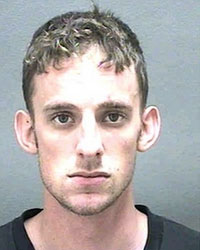
In this photo provided by the Mecklenburg
County Sheriff's Office, Steven D. Green is shown in A booking mug shot at
the Mecklenburg County jail in Charlotte, North Carolina, July 3,
2006. [AP] |
US President Bush, calling the
alleged rape of an Iraqi girl and the murder of her and her family by a US
soldier "a despicable crime, if true," said Thursday that Iraqis will learn
about the openness of American justice.
Steven D. Green, a former Army private with the 101st Airborne Division,
pleaded not guilty to charges Thursday. Green and other soldiers were accused of
targeting the girl after seeing her near the Iraqi town of Mahmoudiya earlier
this year.
"These are very serious charges and what the Iraqis must understand is that
we will deal with these in a very transparent, upfront way," Bush said during an
interview broadcast on CNN's "Larry King Live."
"People will be held to account if these charges are true," Bush said. He
later added: "People will be brought to justice. There will be absolute justice
if this person is guilty."
The US president said he was concerned about how the allegations might color
perceptions of American troops.
"What concerns me is not only the action and, you know, if this is true, the
despicable crime, if true. But what I don't want to have happen is for people to
then say, well, the US military is full of these kind of people. That is not the
case. Our military is fabulous."
Bush said the Iraq government has the right to be concerned about how the
case is handled. "But they've got to be comforted in knowing ... that we will
deal with this in a way that is going to be transparent, above-board and open,"
he said.
Earlier Thursday, Bush questioned whether some of Iraq's neighbors were
working against the fledging Iraqi government.
"We, of course, are concerned that some in the neighborhood may want to
derail the progress of a free Iraq," he said. "And that is troubling and
something that we'll work on."
The US president spoke after meeting in the Oval Office with Zalmay Khalilzad,
the US ambassador to Baghdad, who gave him an update on Iraqi Prime Minister
Nouri al-Maliki's first trip in office to visit his Persian Gulf neighbors.
The United States pushed hard for al-Maliki's trip to Saudi Arabia, Kuwait
and the United Arab Emirates. While al-Maliki received red-carpet welcomes, the
leaders privately made clear they will help the Iraqi government only if he does
more to reach out to Iraqi Sunnis. The Gulf nations are dominated by Sunni
governments leery of Shiite and Kurdish dominance of Iraq since the fall of
Saddam Hussein.
Bush also expressed concern about foreign intervention in Iraq, an apparent
reference to Iran and Syria. US officials accuse the two nations of turning a
blind eye to the influx of violent militants. Both Syria and Iran have denied
the claims, saying it is difficult to fully patrol their porous borders with
Iraq.
"Zal is concerned about foreign influences in the country, as am I," Bush
said.
Bush said Khalilzad gave him a "realistic" briefing on the situation in Iraq.
"On the one hand, he said they've got a good government, goal-oriented people
who are working to achieve certain objectives," Bush said. "And I know that
you've been impressed by Prime Minister Maliki's determination to succeed and
his willingness to lay out a commonsense agenda and then hold people to account.
"Zal also said it's still a dangerous place because there are people there
that will do anything to stop the progress of this new government."
Khalilzad, who went on the trip with al-Maliki, called Iraq the defining
challenge of the time. "What happens in Iraq will shape the future of the Middle
East, and the future of the Middle East will shape the future of the world,"
Khalilzad said.